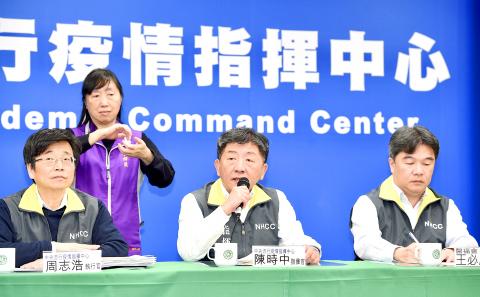The Central Epidemic Command Center (CECC) yesterday reported the nation’s 18th confirmed case of 2019 novel coronavirus (2019-nCoV), which is also Taiwan’s first asymptomatic case: a man in his 20s who traveled to Italy with his parents and brother, with all four transiting through Hong Kong on Feb. 1.
The parents on Thursday were confirmed to have the virus, and their other son’s infection was confirmed on Saturday, said Minister of Health and Welfare Chen Shih-chung (陳時中), the center’s head.
“Although the new case had not suffered any clear symptoms ... we asked him to be tested and the result was positive,” he said.

Photo: Peter Lo, Taipei Times
The man has a high viral load, but it is not yet clear whether he is infectious, the CECC said.
The CECC will determine the identities of passengers seated in the rows behind and in front of the newly confirmed patient on their flight from Hong Kong; if they are Taiwanese, they would be monitored and if they are foreign, the CECC would inform their countries, Centers for Disease Control (CDC) Deputy Director-General Chuang Jen-hsiang (莊人祥) said.
CECC specialists are to discuss whether the criteria for 2019-nCoV tests should be expanded to include people who have had close contact with confirmed cases, even if they do not display any symptoms, Chen said.
Of the 18 confirmed cases, seven initially complained of pneumonia-like symtoms, 10 said they had a fever, 12 people reported coughing and three had runny noses, he said.
The 17 still hospitalized all developed pneumonia, but are in stable condition and do not need additional oxygen, and only one still has a mild fever of 37.9°C.
Meanwhile, six people tested for the virus received negative results from their first test, officials said.
“A total of 811 2019-nCoV-related deaths have been reported around the world, which has already exceeded the deaths caused by SARS,” Chen said. “However, people do not have to panic, as the SARS mortality rate was higher.”
The high number of 2019-nCoV deaths is due to the increased population mobility in China, he said, adding that the mortality is about 2 percent globally and about 5 percent in Hubei Province.
While the transmission dynamics of thenew virus are unclear, it seems to be spreading faster than SARS, he said.
Chuang said the CECC has tracked about 280 people who have had direct contact with passengers of the cruise ship Diamond Princess when they visited Taipei and New Taipei City on Jan. 31 during a port call to Keelung.
Seventy of the ship’s passengers have been confirmed to have the virus as of yesterday and the remaining are still in quarantine aboard the ship in Yokohama, Japan.
If any of the 280 people suffer any suspected symptom of the virus, they should call the CDC’s hotline (1922) for assistance.
Anyone who visited the locations that the ship’s passengers traveled to on Jan. 31 — as announced via a warning message on Friday evening — are advised to see a doctor, Chuang said.
“These locations are very safe now,” as any confined spaces have been disinfected, Chen said.
Additional reporting by CNA

The Taiwanese passport ranked 33rd in a global listing of passports by convenience this month, rising three places from last month’s ranking, but matching its position in January last year. The Henley Passport Index, an international ranking of passports by the number of designations its holder can travel to without a visa, showed that the Taiwan passport enables holders to travel to 139 countries and territories without a visa. Singapore’s passport was ranked the most powerful with visa-free access to 192 destinations out of 227, according to the index published on Tuesday by UK-based migration investment consultancy firm Henley and Partners. Japan’s and

NATIONAL SECURITY THREAT: An official said that Guan Guan’s comments had gone beyond the threshold of free speech, as she advocated for the destruction of the ROC China-born media influencer Guan Guan’s (關關) residency permit has been revoked for repeatedly posting pro-China content that threatens national security, the National Immigration Agency said yesterday. Guan Guan has said many controversial things in her videos posted to Douyin (抖音), including “the red flag will soon be painted all over Taiwan” and “Taiwan is an inseparable part of China,” while expressing hope for expedited “reunification.” The agency received multiple reports alleging that Guan Guan had advocated for armed reunification last year. After investigating, the agency last month issued a notice requiring her to appear and account for her actions. Guan Guan appeared as required,

Japan and the Philippines yesterday signed a defense pact that would allow the tax-free provision of ammunition, fuel, food and other necessities when their forces stage joint training to boost deterrence against China’s growing aggression in the region and to bolster their preparation for natural disasters. Japan has faced increasing political, trade and security tensions with China, which was angered by Japanese Prime Minister Sanae Takaichi’s remark that a Chinese attack on Taiwan would be a survival-threatening situation for Japan, triggering a military response. Japan and the Philippines have also had separate territorial conflicts with Beijing in the East and South China

A strong cold air mass is expected to arrive tonight, bringing a change in weather and a drop in temperature, the Central Weather Administration (CWA) said. The coldest time would be early on Thursday morning, with temperatures in some areas dipping as low as 8°C, it said. Daytime highs yesterday were 22°C to 24°C in northern and eastern Taiwan, and about 25°C to 28°C in the central and southern regions, it said. However, nighttime lows would dip to about 15°C to 16°C in central and northern Taiwan as well as the northeast, and 17°C to 19°C elsewhere, it said. Tropical Storm Nokaen, currently